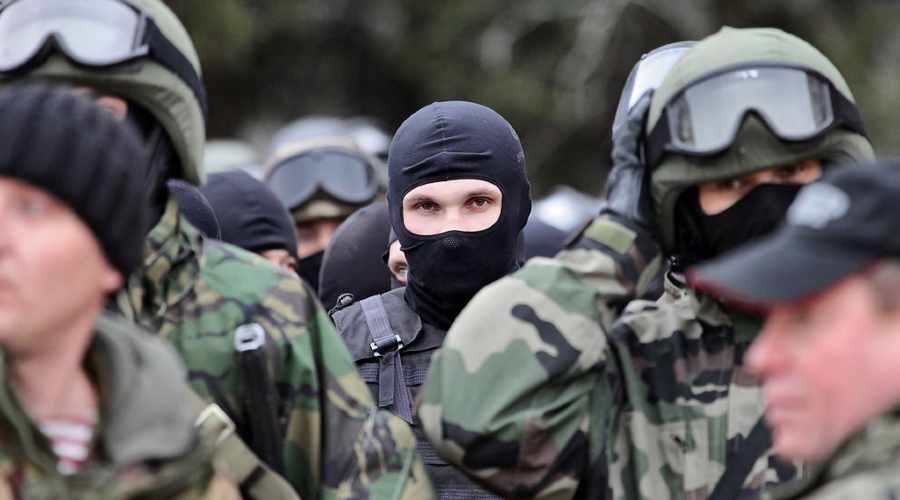The Far-Right Idealized the Russian Military. Ukraine Exposes All the Ways They’re Wrong.
The Russian military's poor performance and apparent war crimes demonstrates the hollowness of its hyper-masculine propaganda.

Editor’s Note: The Russian military has long bragged about its toughness, contrasting its recruits with what it considers the effeteness of the West—a theme picked up by critics of changes in the U.S. military designed to make it more inclusive. Stehanie Foggett of The Soufan Center examines how the poor performance of the Russian military in Ukraine is being portrayed online in far-right circles and argues that now is the time to dispel the myth that hypermasculine militaries fight better than inclusive ones.
Daniel Byman
***
Gender narratives feature heavily in the rhetoric, messaging and propaganda of the far right. The online ecosystems frequented by this movement are rife with rhetoric and visual content that is rooted in misogyny and calls for the subjugation of, and violence against, women and girls. This sexist rhetoric intersects with racist, anti-Semitic, anti-LGBTQ+, and anti-democratic narratives to reinforce the violent worldview of far-right extremism and white supremacy.
One popular falsehood among the far right has been that security is defined by masculinity, and that Russia is the apex of this ideal. This idea has seeped from the fringe to permeate the mainstream, as demonstrated by Sen. Ted Cruz last year when he equated diversity to a U.S. military filled with “pansies.” And on April 5, Rep. Matt Gaetz admonished the U.S. military for falling behind in capabilities and strategy because of “mandatory pronoun training” and other “woke-ism” causes. The ongoing conflict in Ukraine is a strong refutation of these baseless beliefs.
For years now, Russian President Vladimir Putin has learned how to court the far right and tap into their shared disdain of democracy and liberalism. To that end, Russia has made common cause with right-wing political movements in the United States and Europe, as well as through “indirect” support to Western extremist groups. Putin is now in search of fault lines to challenge the cohesion and resolve of the international response to his actions in Ukraine.
To understand the reactions to Russia’s invasion of Ukraine among the online far right, analysts must understand the gender dynamics of these groups. Social and cultural issues provide an ideal focal point for these communities. Russia has been exploiting issues of gender, sexuality and race in the West for years. Putin has mastered how to play into the far right’s lionizing of traditional values and hypermacho authoritarian politics, including the use of sexist and anti-LGBTQ+ rhetoric.
Take, for example, a common talking point among the far right and white supremacists that the United States and other Western militaries are being destroyed by diversity. Milestones in support of gender integration, diversity, and inclusion in the armed forces are met with vitriol and assertions that Western militaries cannot possibly include women, minorities, and LGBTQ+ soldiers without reducing military effectiveness and fighting power.
The far right is fixated on the idea of “natural” gender roles, with men cast as the protectors of white identity in their countries and their women as fragile victims needing to be defended. Their worldview dehumanizes and threatens with violence non-white populations, feminists, and the LGBTQ+ community, whom they consider agitators and subversives not entitled to full rights of citizenship. The far right fights to keep gender equality, LGBTQ+ rights, racial equality, and other human rights causes out of national institutions under the banner of fighting “wokeness,” and their approach to the military is no different. The inclusion of people with diverse gender identities and sexual orientations in the armed forces, as well as efforts to combat historical racial inequality, has been met with expected derision by the far right, and even by some right-wing politicians. “Anti-woke” military discourse on the far right claimed that they would be proven right should the “ranks of wokeness” meet Russia on the battlefield. Events in Ukraine expose how hollow this thinking always was.
Many of these far-right talking points have entered the mainstream. Sen. Ted Cruz tweeted last year that “[p]erhaps a woke, emasculated military is not the best idea,” as he fawned over a video comparing a hypermacho Russian military recruitment ad featuring shirtless, muscular Russian male recruits to a U.S. ad showcasing diverse American recruits representative of what the country actually looks like. In the same vein, BlazeTV host Dave Rubin of The Rubin Report said when comparing the U.S. and Russian recruitment videos: “We’re screwed, people. … Can you imagine that Russian guy coming up against that girl? … If you give me an East Village lesbian versus Vladimir Putin, who’s going to win?” A Fox News article surveying these responses to the opposing recruitment strategies between Russia and the United States highlighted posts by conservatives on Twitter, including one that read, “Pick your fighter.”
Russian state media also entered the debate. In the words of Russia’s English language broadcaster RT, now sanctioned in Europe, the videos “contrasted the Russian approach to attracting men to serve in the armed forces to that recently adopted by the U.S. military,” and another article referred to U.S. military recruits as “slim pickings.”
The moment is ripe to replace the sexist, racist, homophobic, and anti-Semitic tropes that have circulated for years, favoring macho military bravado over smart and inclusive security. The far right and their mainstream pundits assured their audiences of the primacy of hypermasculine military supremacy. With Russia’s poor military performance in Ukraine, this bombast has lost its power. From the beginning of the conflict in Ukraine, the military balance of power was always in Russia’s favor, making the Kremlin’s military losses even more shocking to observers all over the world.
The reasons for Ukraine’s military successes to date are myriad and will be studied by military scholars for years to come. Some aspects, though, directly refute the far-right narrative and are worth highlighting: Women make up an estimated 15 percent of Ukraine’s armed forces and contribute heavily to noncombat support roles. Ukrainian LGBTQ+ soldiers are participating in combat operations and fighting for their country and their lives. And, in reforming its military, Ukraine did not look eastward to Russia but instead west toward meeting NATO military standards, which has included embracing NATO’s common values, rules, and processes, as well as promoting civilian control of the armed forces. This outlook has paid dividends for Ukraine, in contrast to Russia’s mounting death toll, low morale, and inability to control criminality and looting. Accusations of Russian war crimes abound, exposing the vacuous, and often gendered, Russian tropes that assert that their military defends the defenseless.
In Ukraine, the world can see on display the weakness of Russia’s antiquated and ineffective concept of power. Security experts should capitalize on the moment to dismiss once and for all the far-right fiction that masculinity wins wars, that security is not inclusive and that Russia represents any semblance of enviable military standards in the 21st century.





